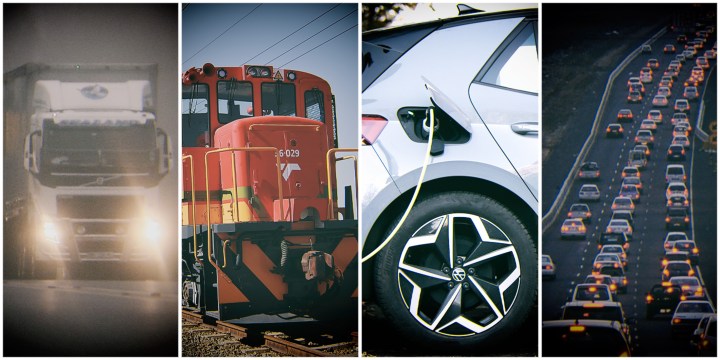JUST ENERGY TRANSITION OP-ED
South Africa must move beyond ‘green transport’ and embrace ‘sustainable transport’

Sustainable transport is a much broader concept than ‘green transport’, and addresses the needs of people to access opportunities and goods to be moved while advancing economic and social development with minimal environmental impact.
Two crucial — and inextricably linked — issues South Africa faces are its dire socioeconomic situation and its severe vulnerability to climate change. The transport sector has the potential to play a key role in mitigating both of these issues.
If our departure point is the need for people to access opportunity and services, and for goods to be available, our approach to the role that transport should play needs a complete rethink.
A just transition to a low-emissions and climate-resilient economy seeks to create a better quality of life for everyone in South Africa while addressing the urgent climate issues facing humanity and considering the legacy left for future generations.
One of the first tasks of the Presidential Climate Commission was to design a Just Transition Framework for South Africa. This framework, which was approved by Cabinet on 31 August 2022, provides a good lens to consider transport’s role in helping to achieve this just transition.
Although part of the conversation and focus of the framework and the Department of Transport’s “Green Transport Strategy” addresses the migration from internal combustion engines to alternative energy systems, key considerations regarding the role of transport are given low priority.
Sustainable transport is a much broader concept than “green transport”. Sustainable transport incorporates the provision of services and infrastructure that safely, affordably and efficiently address the needs of people to access opportunity and goods to be moved, while advancing economic and social development with minimal environmental impact. It thus is both intergenerational and aligns fully with key imperatives of poverty alleviation and reducing inequality and inequity.
Transport that is sustainable is premised on the three key principles of “Avoid”, “Shift” and “Improve”:
- Avoid refers to the reduction or removal of the need to travel, based on changing accessibility and proximity to opportunities through changes in urban form and remote working;
- Shift refers to using less carbon-intensive modes for personal mobility; from private vehicles and flight, to walking and cycling, public transport, and shared mobility such as buses or trains, and for freight from vehicles and aircraft to water-based freight, electrified road-rail freight, pipelines and cargo bikes for first/last-mile collections and deliveries. Less car-dependent infrastructure and travel demand initiatives are considered key here; and
- Improve refers to the improvement of vehicle design and energy efficiency, and developing alternative clean or renewable energy sources for different types of freight and passenger vehicles.
Visit Daily Maverick’s home page for more news, analysis and investigations
The current technologically driven focus is on green transport, which sits primarily in the “Improve” category. This area provides the most opportunity for industry to generate profit. While this “Improve” element is extremely important, the focus also has a number of critical weaknesses. In short, it simply entails replacing one source of energy with another, rather than addressing the broader issues.
Much of South Africa’s land-based transport system design is based on the extensive use of private motor vehicles to travel within the country’s sprawling cities and towns. This has inherent limitations and inefficiencies with high congestion levels and long commute distances for the majority of our population — many of whom spend a significant proportion of their earnings on transport.
This will not change materially if we remain initially focussed on “Improving”, by, for example, replacing internal combustion engine vehicles with electric passenger vehicles and possibly hydrogen for busses and goods vehicles.
What is also essential is to revisit our urban and transport planning methodologies, so that we do not lock in the inefficiencies of the current planning approaches and lock out social and environmental benefits from compact and mixed-use precincts and neighbourhoods in our cities and towns. As any transport system or urban development has both long planning lead times and long lifespans, any system currently that does not immediately incorporate the principles of “Avoid” and “Shift”, will compromise both climate change imperatives and the broad achievement of a Just Transition.
Read on Daily Maverick: Should electric cars be used in a country with an energy crisis as serious as South Africa’s?
It is time to draw a deep breath and reconsider how we want our cities and towns to look. Surely we envision vibrant places where people can live, work and play; where it is easy, safe, and affordable to move around on foot, by bicycle and by public transport? Should we not be redesigning our cities and towns as 15-minute precincts where nearly everything we need (including public transport) is within 15 minutes’ walking distance or cycling distance of where people live?
Taking this approach will not only help to address South Africa’s social issues, but also significantly contribute to the essential reduction of carbon emissions and the aims of the Just Transition. DM
Gordon Laing is a registered professional civil engineer and a Fellow of the Institute of Directors Southern Africa. He serves on the governing bodies of the Bicycling Empowerment Network, the Pedal Power Association and the Cape Town Cycle Tour Trust.






















 Become an Insider
Become an Insider
Comments - Please login in order to comment.